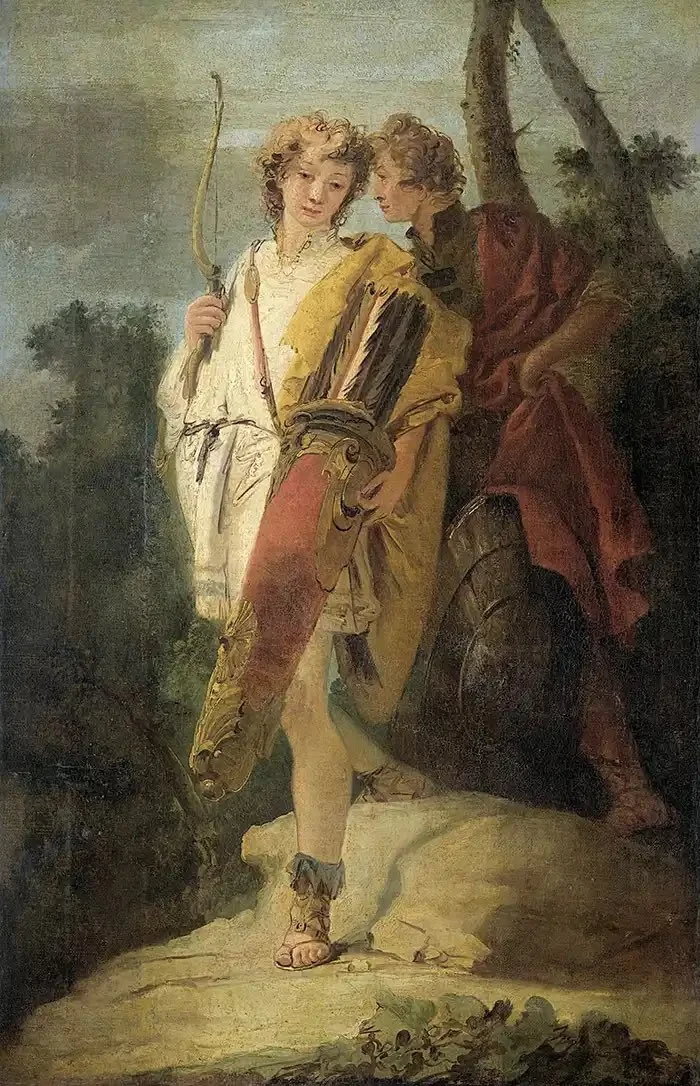THE STAGE IS SET
“Sing to me, Muse, of the man of twists and turns.”
Art: Telemachus and Mentor by Giovanni Battista Tiepolo, c. 1730-50, via @rijksmuseum , Amsterdam.
What an enticing opening to the epic! If you’re reading along with my class, you’ll have noticed that it’s all action, and right away. Book 1 is dramatic and full of conflict: the conflict between the gods themselves, the conflict between gods and mortals, between suitors and Telemachus, even between Telemachus and his mother, Penelope. When I read this book, I tend to think of it moving through the following parts or movements. First, we drop right into the counsel of the gods. This helps us situate the story in the aftermath of the Trojan War. Yes, Greece has been victorious—but what does that mean? Troy has been burned to the ground. Many Greeks have died, too. We even hear of the tragic homecoming of King Agamemnon, murdered upon arrival by his wife Clytemnestra and her lover Aegisthus. The king’s son, Orestes, was away when this happened, according to Homer. But when he comes of age, he avenges his father by killing his mother and her over. As a result, he is pursuer to the ends of the earth by the Furies. (Orestes also appears in several Greek tragedies, including The Oresteia by Aeschylus, Electra by Sophocles, and plays by Euripides.) The presence of his story in Book 1 is a clear contrast: Penelope, Odysseus’s loyal wife, is no Clytemnestra. But Telemachus will indeed be called to come of age, in a different but no less brutal way when he helps his own father slaughter the suitors at the end of the epic. The counsel of the gods also clearly sets up allegiances: we learn that Odysseus has angered Poseidon — we’ll hear more in Book 9. And that Athena, after all these years, remains clearly on the side of Odysseus. But Poseidon is absent today, and Athena, the wise, the goddess of battle, sways Zeus. It is time to send Odysseus home. That is the topic of this story. That is the tale the Muse sings: of the journey home of Odysseus, the cunning, the man of twists and turns. Athena decides to pay Telemachus a visit and send him on a journey for news of his father, so that he might begin to prepare for his homecoming. To accomplish this, she disguises herself as “Mentor”—and just as it sounds, acts as his mentor as he begins the journey of coming of age. In spite of everything he has endured at the hands of the suitors, who are eating their way through his house and drinking his wine reserves, as they wait for Penelope to decide which one of them she’ll marry, Telemachus receives Mentor according to the Greek tradition of hospitality. Before asking him questions, he welcomes him in and feeds him. We have a second important contrast here: of the suitors, who abuse the tradition of hospitality, and Telemachus, who honors it. As Mentor answers Telemachus’s questions, s/he tells the truth: s/he is one of Odysseus’s oldest friends. Telemachus looks a lot like him, which prompts the young man to claim his lineage, even though they’re surrounded by suitors who disrespect him. He declares: “I am his son!” This is a catalyst, an important turning point, that marks the beginning of Telemachus’s character arc. Athena as Mentor urges him to step into his power: “It’s time you were a man!,” she says. As we learn in the next book, Penelope has been holding down the fort with her weaving, but sooner or later, if Telemachus doesn’t step up, she’ll be forced to marry. In a highly dramatic moment, we watch Telemachus change in front of our very eyes: when Penelope comes downstairs, Telemachus instructs her (rather sternly) to go back to her chambers. She doesn’t resist, and this isn’t because she’s being submissive. She, too, must recognize the change in her son. And perhaps she, too, sees Odysseus in him now more than ever.
-
Read the Odyssey online in the translation by Robert Fagles, or order the paperback.
Watch the video introduction from TED Ed.
